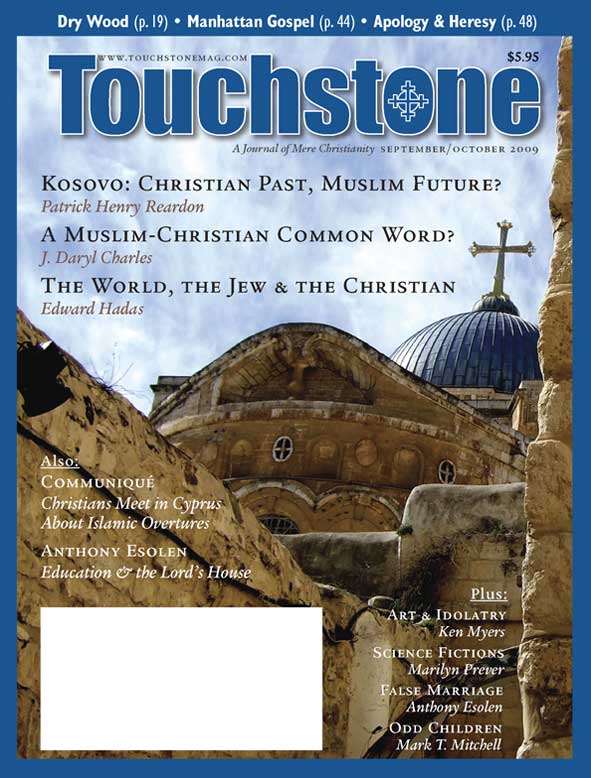Married with Reservations
Our Private Misgivings Have Public Consequences
I have written in a Mere Comments post that the real social problem we in America face is the number of people who are not married who behave as if they were. I’d like to revise that claim. Our problem is pseudogamy, false marriage, and it assumes many forms. Same-sex pseudogamy is but the latest and most flagrantly absurd, but it is not the first.
We find the most fundamental form, from which other corruptions rise up like diseases, when a man and woman go through the ceremony and utter the traditional words “as long as you both shall live,” while harboring the mental reservation, “as long, that is, as I am happy,” or “as long as the marriage ‘works,’” whatever that is supposed to mean. In other words, in the fundamental form of pseudogamy, we don’t have people who are not married behaving as if they were, but people who are married (or who present themselves as having been married) behaving as if they were not.
Why should anyone care about the private mental reservations entertained by the couple next door? The obvious answer is that those reservations are not really private. They will inevitably be talked about, urged upon others, or acted upon, if not by the couple next door, then by the couple two doors down.
And then their problems are also ours. We must live with their divorce. We must try to teach their addled children. We must get along in neighborhoods blasted by the instability and the chaos. We must help feed the sharks in the divorce industry. We must suffer the now greater probability that other couples near us will follow their example. A culture in which divorce is common is a different thing from one in which it stands under severe disapproval; and everyone, divorced or not, must breathe the same cultural air.
The Foundation of Our Being
That’s the obvious answer, but not the best one. The best answer examines what we in our culture of divorce have nearly forgotten, namely, the high and adventurous calling that marriage truly is. “Should a man give the woman he is weary of a bill of divorce?” ask the scribes, and Jesus replies by reaching behind all human custom, and behind all of the Mosaic law’s concessions to human weakness, by reminding us that it was not so from the beginning—which is to say also that it is not so now, from the foundations of our beings. “What God has joined together,” says Jesus, “let no man put asunder.”
I’ll defer to a later time a discussion of what Pope John Paul II called the “nuptial meaning” of our bodies, male and female, and how the phrase “what God has joined together” makes no sense if it does not at least refer to that wondrous created reality.
When does God “join together” man and woman? What is the metaphysical status of that joining? Jesus is not speaking of fornication, that other thing that mimics marriage, wherein man and woman become one flesh without intending to become one flesh. Then it is not merely the joining of bodies male and female that matters (though that is a necessity). Somehow God must effect the joining.
But the God we are talking about, the God of Israel revealed to us in the flesh by Jesus the Son, is one who is Love itself. Love—the love that moves the sun and the other stars, the love divine that came down from heaven in tongues of flame, the love that hung upon the cross—is not a compromising neediness, as the Stoics thought, but the complete disposing of oneself to another, “being for,” as Pope Benedict puts it. In love and only in love do we discover the beauty of another being, and only in love do we become ourselves, for he who would save his life will lose it, but he who would lose his life will save it, unto life everlasting.
Anthony Esolen is Distinguished Professor of Humanities at Thales College and the author of over 30 books, including Real Music: A Guide to the Timeless Hymns of the Church (Tan, with a CD), Out of the Ashes: Rebuilding American Culture (Regnery), and The Hundredfold: Songs for the Lord (Ignatius). He has also translated Dante’s Divine Comedy (Random House) and, with his wife Debra, publishes the web magazine Word and Song (anthonyesolen.substack.com). He is a senior editor of Touchstone.
bulk subscriptions
Order Touchstone subscriptions in bulk and save $10 per sub! Each subscription includes 6 issues of Touchstone plus full online access to touchstonemag.com—including archives, videos, and pdf downloads of recent issues for only $29.95 each! Great for churches or study groups.
Transactions will be processed on a secure server.
more from the online archives
calling all readers
Please Donate
"There are magazines worth reading but few worth saving . . . Touchstone is just such a magazine."
—Alice von Hildebrand
"Here we do not concede one square millimeter of territory to falsehood, folly, contemporary sentimentality, or fashion. We speak the truth, and let God be our judge. . . . Touchstone is the one committedly Christian conservative journal."
—Anthony Esolen, Touchstone senior editor











